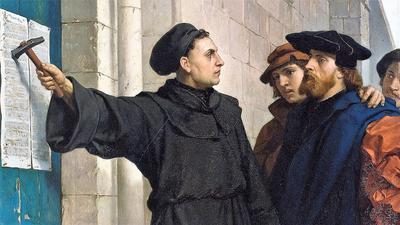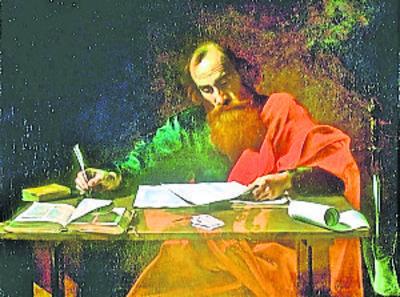‘Faith and reason are like two wings on which the human spirit rises to the contemplation of truth; and God has placed in the human heart a desire to know the truth’ (John Paul II, Fides et Ratio, p.1).
‘For the wrath of God is revealed from heaven against all ungodliness and unrighteousness of men who suppress the truth in unrighteousness…’ (Romans 1:18).
The latest Papal Encyclical, issued last September (1998) and addressed to the Roman Catholic bishops, is a major work on the relationship between theology (‘faith’) and philosophy (‘reason’). Released to mark the twentieth anniversary of his pontificate, Pope John Paul II has apparently spent much of the last decade on the document, which runs to more than 36,000 words and ranges widely over the theological and philosophical landscape of the modern era.
Learned but flawed
Fides et Ratio is at one and the same time a learned and yet fundamentally flawed work: learned, because it is clear that the pope is widely read and understands something of the abyss of meaninglessness into which much postmodern thinking is staring (chapter 1, para. 5); yet also flawed, on account of the place of honour accorded to human reason. This, he maintains, is merely ‘wounded’ or ‘impaired’ as a result of the Fall (chapter 2, para. 22), rather than being totally corrupted by sin.
Evangelicals will sympathise with the pope’s lament regarding the futility of much (most?) current philosophical and theological endeavour, whether Roman Catholic or nominally ‘evangelical’. But we should understand from the outset that he is simply not in possession of the requisite (biblical) tools to offer a remedy for this desperate situation – something he is keen to do.

In short, we find that the dilemma which the pope faces is the typical Roman Catholic problem, namely, the denial of the biblical understanding of the effects of the Fall, and the elevation of so-called ‘natural theology’. In other words, he relies on the general revelation of God in nature (through which man is said to be capable of knowing God), rather than on the special revelation given solely in the Bible which, evangelicals have always insisted, is essential if man is to relate to his Creator.
Modernisation
The situation which the pope sees within the Roman Catholic Church – one in which philosophical activity has led to ‘atheistic humanism’ and ‘nihilism’ (chapter 4, para. 46) and a pervasive ‘deep-seated distrust of reason’ (chapter 5, para. 55) – is not, of course, restricted to his communion. In fact, liberal Protestantism is awash with the same destructive trends, and the unmistakable evidence is that evangelicalism is treading the same path.
The Church of Rome opened herself to such trends at the Second Vatican Council (1962-65) which had as its central thrust ‘aggiornamento’, or ‘modernisation’. It gave official sanction to such notions as the possibility of salvation beyond the confines of Christian witness (notions now embraced by ‘evangel-icals’ such as Clark Pinnock, Robert Schuller and Billy Graham!).

Accordingly, the process of doctrinal fragmentation has accelerated over the past three decades. To be sure, Rome has her catechism as a point of reference, but her openness to all manner of philosophies and ideas means that she can, at one and the same time, embrace academic liberals, charismatics, ultra-traditionalists, syncretists, New Agers and Vatican II conformists. This is the ship, tossed about by every wind of doctrine, which the pope is seeking to steady by a return to the right use of reason, which, together with faith, will set humanity back on the noble voyage in search of truth. That, at least, is the hope set forth in the Encyclical.
Illusion
The Encyclical itself is a weighty document. Many will be put off by its high philosophical tone and relative lack of the moral teaching or ethical dimension evident in so many of the pope’s official pronouncements. (Not that practical application is entirely missing; the pope is clear that the recovery of the philosophical-theological enterprise is essential to the devising of ‘the true and planetary ethics which the world now needs’. Conclusion para. 104.) Yet it cannot be said that the document is turgid or uninteresting.
Nevertheless, reading the Encyclical is a strange experience for an evangelical unused to the paradoxical argumentation typical of Roman Catholic teaching. Throughout the one hundred and eight paragraphs spanned by its introduction, seven chapters and conclusion, the document maintains an illusion. The illusion resides in the idea that the need for reason to operate only within the confines of Christian faith can be reconciled with the propriety of autonomous rational endeavour. What do we make, for example, of an argument such as this?
‘(The Church’s) mission on the one hand makes the believing community a partner in humanity’s shared struggle to arrive at truth; and on the other hand it obliges the believing community to proclaim the certitudes arrived at, albeit with a sense that every truth attained is but a step towards that fullness of truth which will appear with the final Revelation of God’ (Introduction, para. 2).
Does it not appear that what the pope asserts in one breath is then smartly taken away in the next? On the one hand he can talk about Christian ‘certitudes’, yet on the other he describes a shared Christian/non-Christian struggle to seek truth. Of course, he is clever: there is a sense in which the Christian’s understanding of truth is incomplete and partial. Yet the essentials of the faith have been revealed in the Scriptures and can be grasped. In this sense there is no further essential truth to uncover (especially regarding salvation).

What the believer is engaged upon is a lifelong process of being built up in the truth, and of himself building on that truth. What he is not expected to do is to engage in some sort of partnership with non-Christians in the search for truth. That is more likely to lead in precisely the opposite direction!
Icing on the cake?
Elsewhere, the pope argues: ‘with the light of reason human beings can know which path to take, but they can follow that path to its end, quickly and unhindered, only if with a rightly tuned spirit they search for it within the horizon of faith’ (chapter 2, para. 16).
Again, one wonders exactly what the point of Christian belief is. Apparently the unbeliever already has light and can know which path to take in the search for ultimate meaning, because ‘the thirst for truth is so rooted in the human heart’ (chapter 3, para. 29). In reaching this understanding, Christianity is presented as the icing on the cake; desirable but not essential. It speeds man on the way to the attainment of truth, and may indeed offer a superior version of it, but in the final analysis it makes no essential contribution to his salvation.
All this is profoundly depressing and yet extremely revealing. It is sad that evangelicals who have been tempted into ecumenical ventures (such as the two Evangelicals and Catholics Together statements) cannot see that what the pope is promulgating as official Roman teaching is antithetical to biblical Christianity. But they should certainly note his scathing dismissal of essential evangelical teaching, when he rejects as ‘biblicism’ our belief in the sole authority of Scripture (chapter 5 para. 55).

Time to return
It is time for evangelicals who are worthy of the name to return with conviction to Reformation principles. With regard to both teaching authority and the revelation of ultimate truth, we must be unafraid to reaffirm ‘Sola Scriptura’. Of course, the pope is able to argue as he does because of the Romanist concept of authority, which resides in a combination of the Scriptures, Tradition and the Magisterium (the teaching authority of the Roman Church). Accordingly, he can give a place to the unaided reason of the natural man because he is not bound to the sole authority of the Bible. The search for truth undertaken by the noble pagan thus becomes just as ‘Christian’ (although anonymously so) as that of the committed believer.
In the end, we must conclude that John Paul II has neither an answer to the relativism and irrationality of our day, nor the true gospel to proclaim. The partnership he advocates between faith and reason, theology and philosophy, special revelation and general revelation, implies a partnership between Christian faith and the insights and experiences offered by other religions and belief systems.
In reality, the Roman Catholic concept of authority effectively sidelines and replaces the Scriptures by the syncretistic mix of teachings which constitute Roman Tradition. And what of Christian faith according to Roman Catholicism? Do not works (the self-salvation taught by natural religion in all its forms) actually supplant faith, which alone is necessary for man to enter a relationship with God (Galatians 2:16)?

Many paths?
And, tragically, what of Christ himself? Do we not in this Encyclical find another Christ who can be encountered in the lifelong quests of adherents of other faiths? For, according to the pope, ‘There are many paths which lead to truth, but since Christian truth has a salvific value, any one of these paths may be taken, as long as it leads to the final goal, that is to the revelation of Jesus Christ’ (chapter 4, para. 38). We should not be misled by these words. Since the paths in question are not Christian paths, it goes without saying that the ‘revelation’ to which they lead is not that of the Christ of Scripture.
Although the pope mentions Paul’s encounter with the pagan philosophers in Athens (Acts 17), we must wonder whether he really has anything in common with the apostle. Crucially, we recall that Paul’s ‘spirit was provoked within him when he saw that the city was given over to idols’ (v.16). By contrast, John Paul II seems not a bit provoked in his spirit by pagan philosophy. On the contrary, he seems content to commend natural man in his sincere quest for truth.
Furthermore, on seeing the altar with the inscription ‘To the unknown god’, Paul proceeded to reveal to these pagans the truth about the real, living and knowable God. In contrast, the pope will leave men in their ignorance to take whichever path they choose.
Of course, it will be the path to hell. ‘What has Athens to do with Jerusalem?’ asked Tertullian. Let us indeed remember that Rome openly proclaims ‘another gospel’ and let us say so equally openly in this dark hour.



